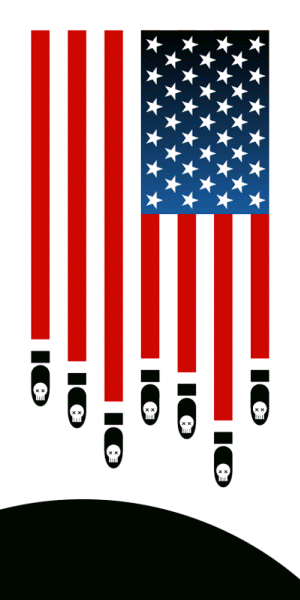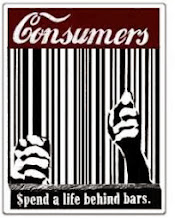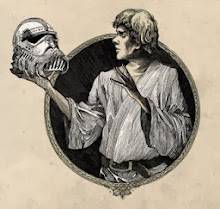Puppy Island (A Fairy Tale) by Michael A. Kechula

PUPPY ISLAND (A Fairy Tale)
by Michael A. Kechula
There once was a youngster named Harold who lived on a beautiful Island in the middle of the Pacific Ocean.
Harold and his family, and everyone else who lived there thought they were puppies, because their homeland was named Puppy Island. But they weren’t puppies. They were really giant cockroaches. If they had been puppies, they would’ve had fairy godmothers to tell them exactly what they were. But unlike every other living thing on Earth, giant cockroaches didn’t have fairy godmothers to tell them anything. Why that was so was one of the greatest mysteries of the Universe.
Puppy Islanders were always deeply depressed. Nobody knew why. Everyday upon awakening they’d ask themselves and everyone around them, “Why do we feel so blue? Aren’t puppies always supposed to be happy? But we never are. How can that be?”
The truth was that giant cockroaches by their very nature were depressed. It was the way they were created. Elsewhere on Earth where giant cockroaches lived, the situation was the same. Since many of them inhabited far away lands where puppies also lived, the cockroaches asked the puppies for a favor. “Since you guys are lucky enough to have fairy godmothers, please ask them why we giant cockroaches are always so miserably down-hearted.”
The puppies’ fairy godmothers all gave the same answer: “Some things are happy all the time, and some aren’t. You should’ve been born puppies instead of giant cockroaches. Then you’d always be happy.”
But Puppy Island was isolated from the rest of the world, so Harold, his family, and all the other residents never learned this.
One day when Harold was playing on the beach, some scientists came ashore in a rowboat. They asked him to take them to the King. Though surprised to see other living things who didn’t look like him, Harold complied.
King Puppy The Twenty-Third was amazed to see living things, who weren’t puppies, standing before him. Nevertheless, he welcomed them.
“We the puppies of this great land offer you our blessings and hospitality. From whence have you come?”
“America.”
“Where’s that?”
“Far away.”
“How did you get here?”
“On an aircraft carrier.”
Their intriguing answers led to a long discussion in which the scientists informed the King that he and his subjects weren’t puppies.
“Nonsense!” shouted the King. “Prove it!”
“Okay,” said the scientists, “we’ll conduct a test.”
When the King agreed, the scientists asked to be taken to the island’s highest hill. They also asked that all inhabitants of the island gather at the bottom.
The next day, King Puppy accompanied the scientists to the hill. When reaching the top, the scientists threw 10,000 Frisbees toward the sky. All sailed through the air for a while, then fell to the ground.
“If you were puppies,” said a scientist, “everyone at the bottom of this hill would’ve chased the Frisbees, caught them before they landed, and returned them to us. The only things in the world that don’t chase Frisbees are giant cockroaches. Therefore, you and your subjects are giant cockroaches, not puppies.”
Though utterly astonished, everyone believed the scientists. But that didn’t end their depression.
“We can help you get rid of depression,” a scientist said. We’ve invented a thermonuclear device called a Happy Bomb. If you’ll let us explode one over your island, everyone will start laughing. But we don’t know for how long. The only residents of this island who won’t be happy afterward will be those who don’t eat corn flakes for breakfast.”
The King agreed to the test. He figured two good things would happen if the test succeeded. First, everyone would finally feel happy for a while. Second, he could rid the island of imprisoned criminals. Annual costs for their care and feeding drained billions from the national treasury—-a most depressing situation.
The date was set. The King chose Harold to pull the string that would detonate the nuclear bomb, as it floated five hundred feet overhead in a hot air balloon.
The King ordered all his subjects, except prisoners, to eat corn flakes for breakfast.
When Harold pulled the string, a brilliant flash and gigantic noise raced halfway around the world. Everyone was dumbfounded by the huge, colorful, mushroom cloud that formed and reached high into the sky.
Suddenly, everyone except the dead prisoners started laughing. Their laughter lasted six months without letup. But when they stopped, they felt terribly depressed once again.
After much deep thought, Harold got an idea. He went to the King and said, “If you will build boats, make me a Prince, and give me a thousand followers, we will row to America and steal their Happy Bombs. Then we will be able to laugh again.”
“Brilliant idea!” said the King.
Prince Harold and his men went to America, stole all the Happy Bombs, and arrived home safely.
The next day, Harold set off another bomb over the island. Everyone started laughing again, except the newest batch of prisoners who died because they were denied corn flakes for breakfast.
This time, everyone on Puppy Island laughed continuously for a whole year.
Afterward, Harold met with the King. While giggling, he said, “Now that we have the secret of creating and sustaining perpetual happiness, we can eliminate sadness throughout the world forever by exploding our Happy Bombs over every nation. Allow us to do this, and you’ll be famous and forever beloved by all the inhabitants of the Earth.”
The King heartily approved Harold’s plan. He also approved Harold’s idea of changing the island’s name to Ha-Ha Island.
Harold and his men secretly setup Happy Bombs over every nation on Earth. To celebrate the King’s birthday, Harold gave him a very, very long string that was connected to all the bombs around the globe.
“Happy Birthday,” his subjects cried, as the King pulled the string.
And that is why everyone in the world is always so happy, the word depression has disappeared from dictionaries, and so many nations have thermonuclear bombs.
Author bio:
Michael A. Kechula is a retired tech writer. His fiction has won first place in seven contests and placed in six others. He’s also won Editor’s Choice awards four times. His stories have been published by 107 magazines and 30 anthologies in Australia, Canada, England, India, Scotland, and US. He’s authored a book of flash and micro-fiction stories: “A Full Deck of Zombies--61 Speculative Fiction Tales.” eBook available at www.BooksForABuck.com and www.fictionwise.com. Paperback available at www.amazon.com.











No comments:
Post a Comment